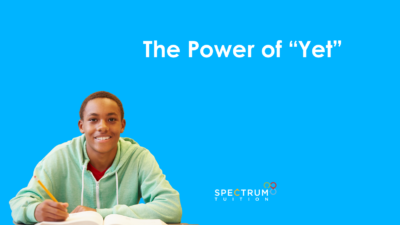I recently came across a TED talk by Carol S Dweck, a Professor of Psychology at Stanford University, that explained the profound potential of the simple word “yet”. This talk resounded with our beliefs regarding learning and education, so we thought we should share it with you, and explain some of the ways in which we, as tutors and you, as parents, can use these ideas to help our students reach their full potential.
What is the power of “yet”?
In her talk, Dweck distinguishes between two student mindsets that she has encountered in her research: “fixed” and “growth”. When students with a “fixed” mindset are faced with a difficult or unfamiliar problem that they can’t solve, they tend to take it as a judgement on their own intelligence. “Fixed” mindset students are happiest when they are getting answers right, when they are getting A’s on their tests, when they can easily answer questions. However, when faced with new ideas and concepts, they tend to get defensive. In various studies, Dweck has found that these students resort to cheating, deflection, and giving up when faced with difficult problems.
On the other hand, students with a “growth” mindset are those that view difficulties as opportunities for growth. Instead of looking at an unfamiliar problem and saying “I don’t know how to do this,” they say: “I don’t know how to do this yet.” Dweck has found that students who use this sort of language aren’t stuck in the present. They understand that they are always in a continual process of learning and developing. Saying “not yet” instead of “not” suggests the possibility for future growth.
Why is this important?
On a daily basis, we see the profound impact that these two mindsets can have on a student’s performance. In particular, a “fixed” mindset can cause difficulties for students transitioning from primary school to high school, students studying for a Select entry or Scholarship Exam, or students commencing their VCE. At these points of their education, students are going to be faced with a number of challenging concepts and difficult tasks. Often, at these times, students can become overwhelmed and go from getting straight A’s to suddenly getting C’s or D’s. This, in itself, is not the problem. What’s important is how they respond to these challenges. Do they give up, or do they use their limitations as motivation to learn more?
So, what can we do?
Obviously, students with “growth” mindsets are more likely to respond positively to challenges and, ultimately, to perform better than those with a “fixed” mindset. But what can we, as tutors, and you, as parents, do to ensure that your child develops a healthy and productive mindset? Here are some things to keep in mind…
1. Praise wisely
Students who are only praised for their successes are much more likely to develop “fixed” mindsets. According to Dweck’s findings, it’s much more productive to praise students for effort, strategy and progress. As tempting as it is to only reward good performance, make sure you primarily praise your child when they work hard, when they refuse to give up, when they try something new. This will teach them that there is more to education than just getting the answer right.
2. Use growth-based language
It’s also important to be mindful of the language that you and your child use. Try to avoid language that labels a student “good” or “bad” at something. Instead of saying “I’m bad at maths” or “I can’t write an essay,” say “I can’t do this particular question yet” or “I have a lot to learn about essay writing.” When giving feedback to students, aim to use language that is specific, goal-oriented, and suggests the potential for future learning.
3. Provide constant challenges
“Fixed” mindsets can also develop when naturally able students are not given sufficient challenges. This is something we see all the time; clever students are often allowed to drift through school, achieving high marks with relatively minimal effort. Unfortunately, these students rarely learn how to deal with challenges, and tend to give up when things may not be so easy anymore.
That is why it is important for students to work at or just above their level, to ensure that they are constantly challenged in order for them to grow and develop. If they find some sections difficult, use this as an opportunity to praise their effort, strategies and progress, because it is not that they can’t do it, they just can’t do it yet!
If you want to watch Carol S Dweck’s video it’s just below
Feel free to contact us if you have any questions about how we can help your child develop a healthy and productive mindset towards their education or click the link below to book a free assessment.
While you’re here, why not check out our handy guide to goal setting, designed to help our students achieve their academic goals? Click here to download your FREE copy!


